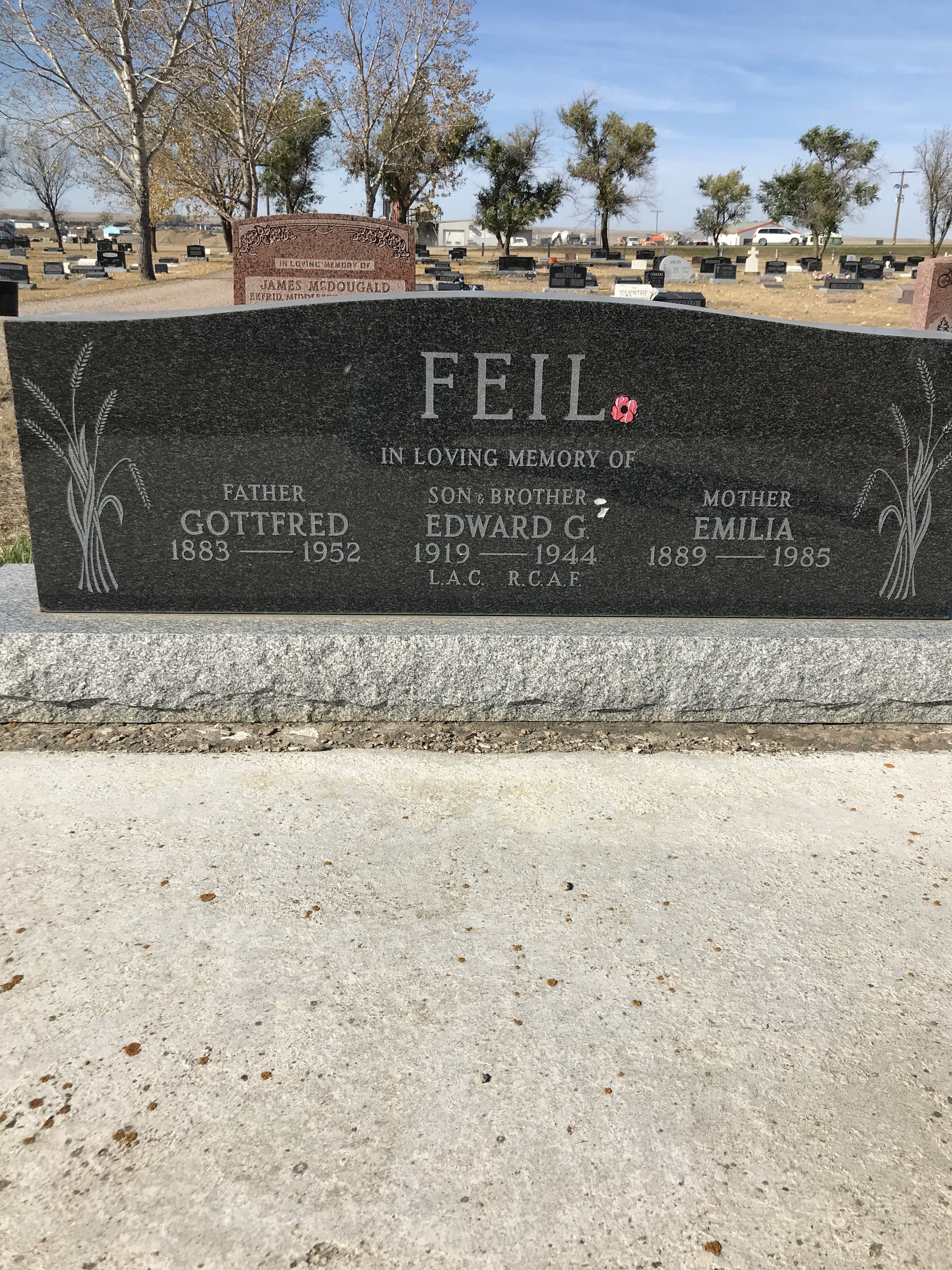
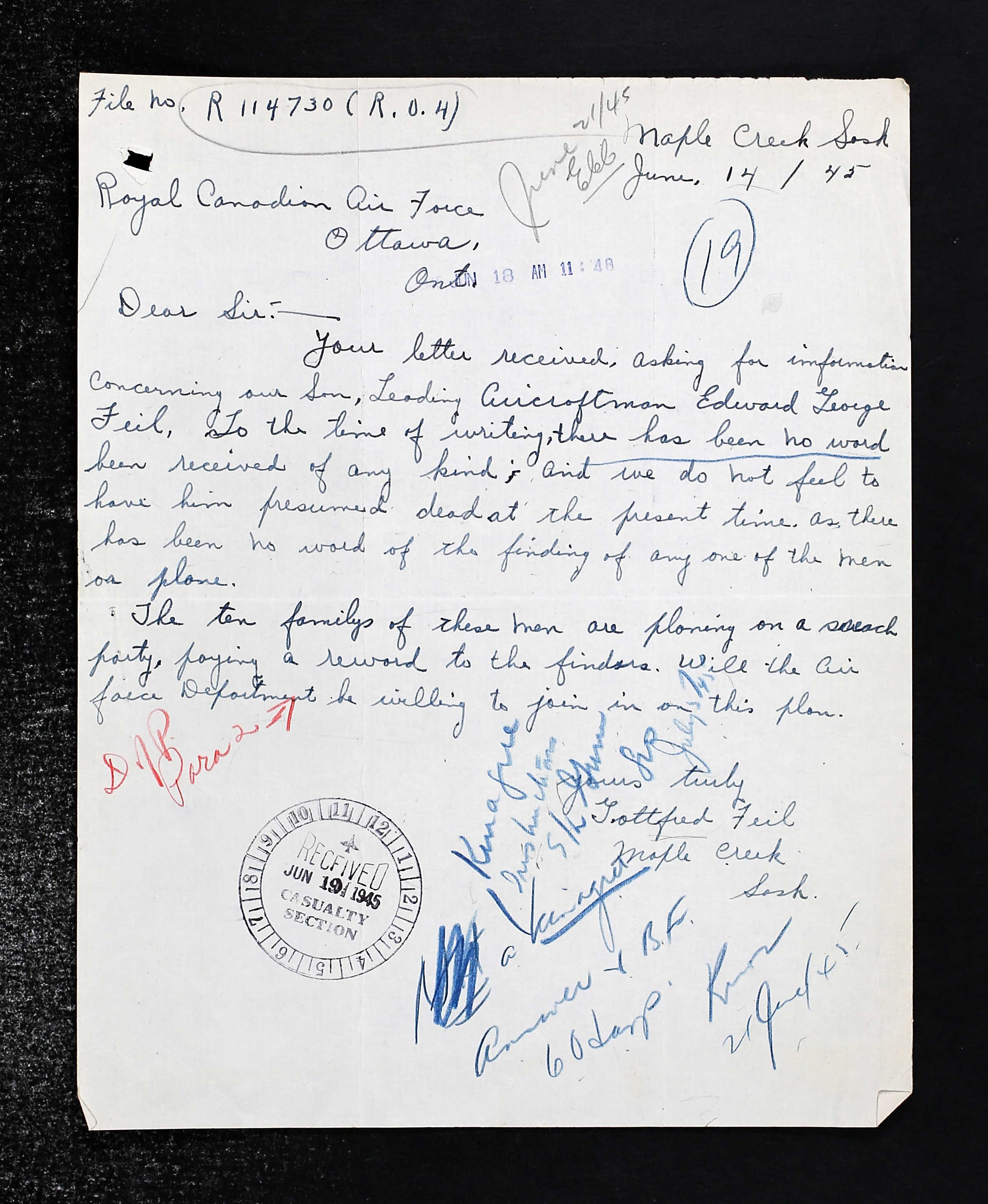
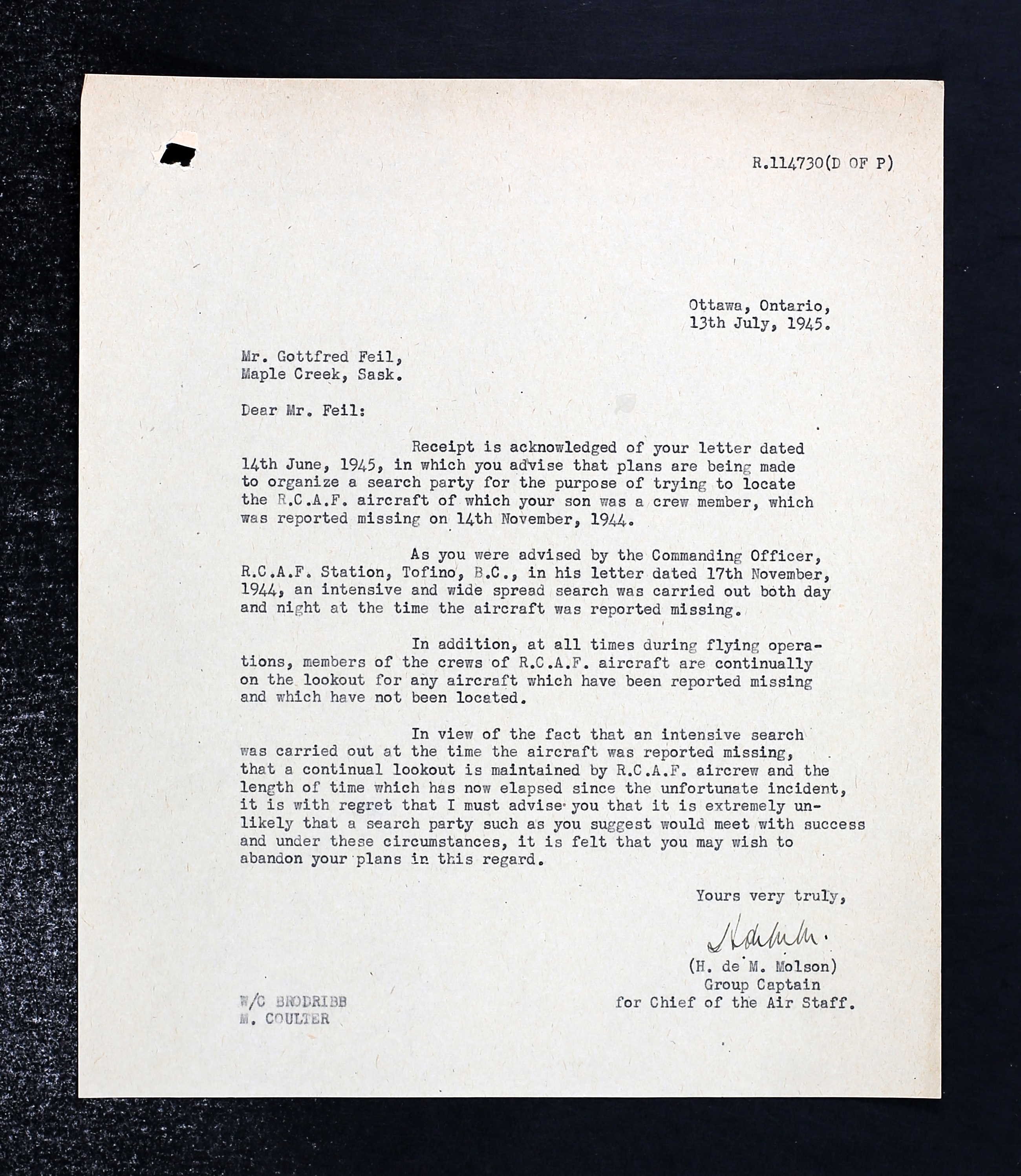
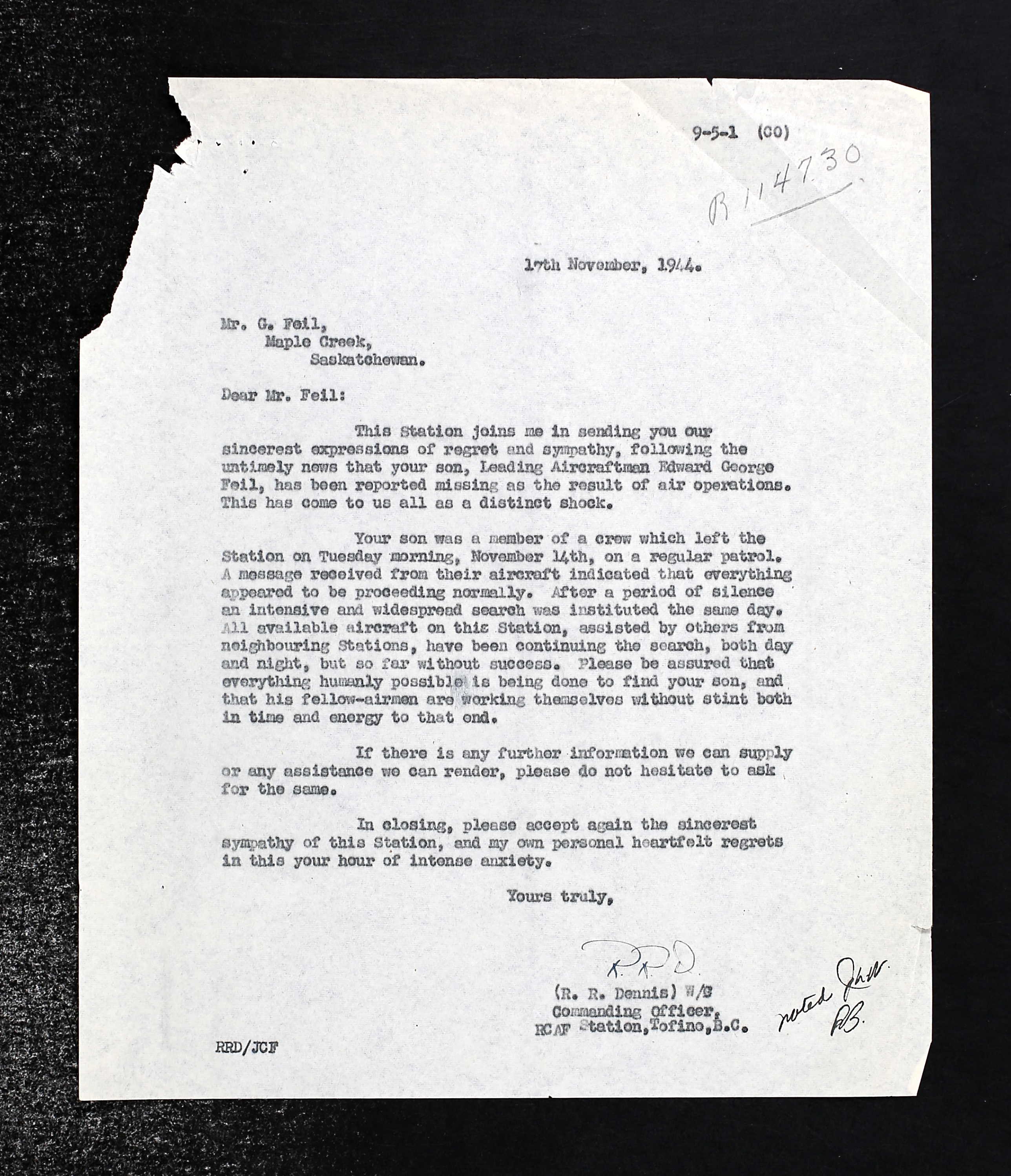
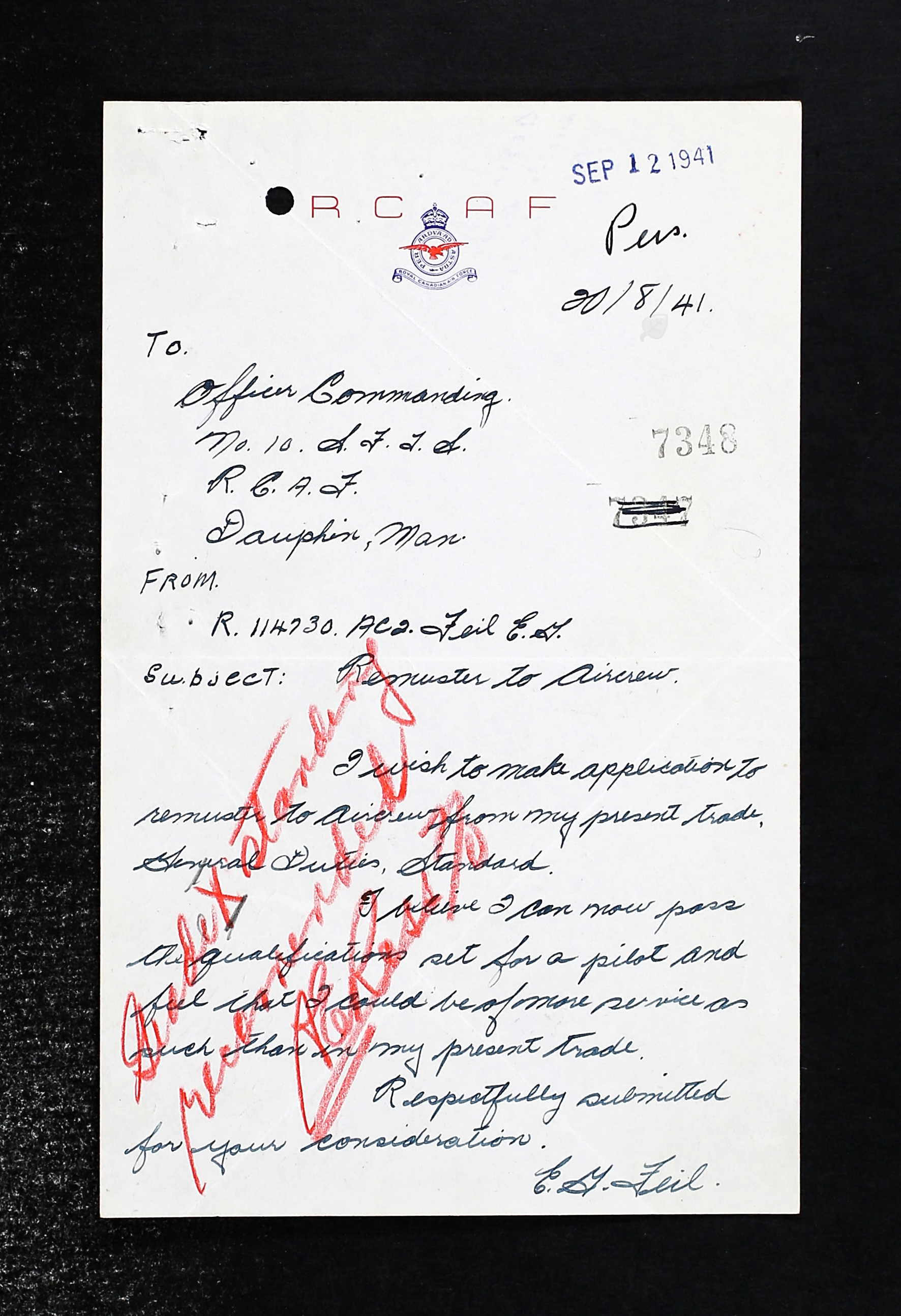
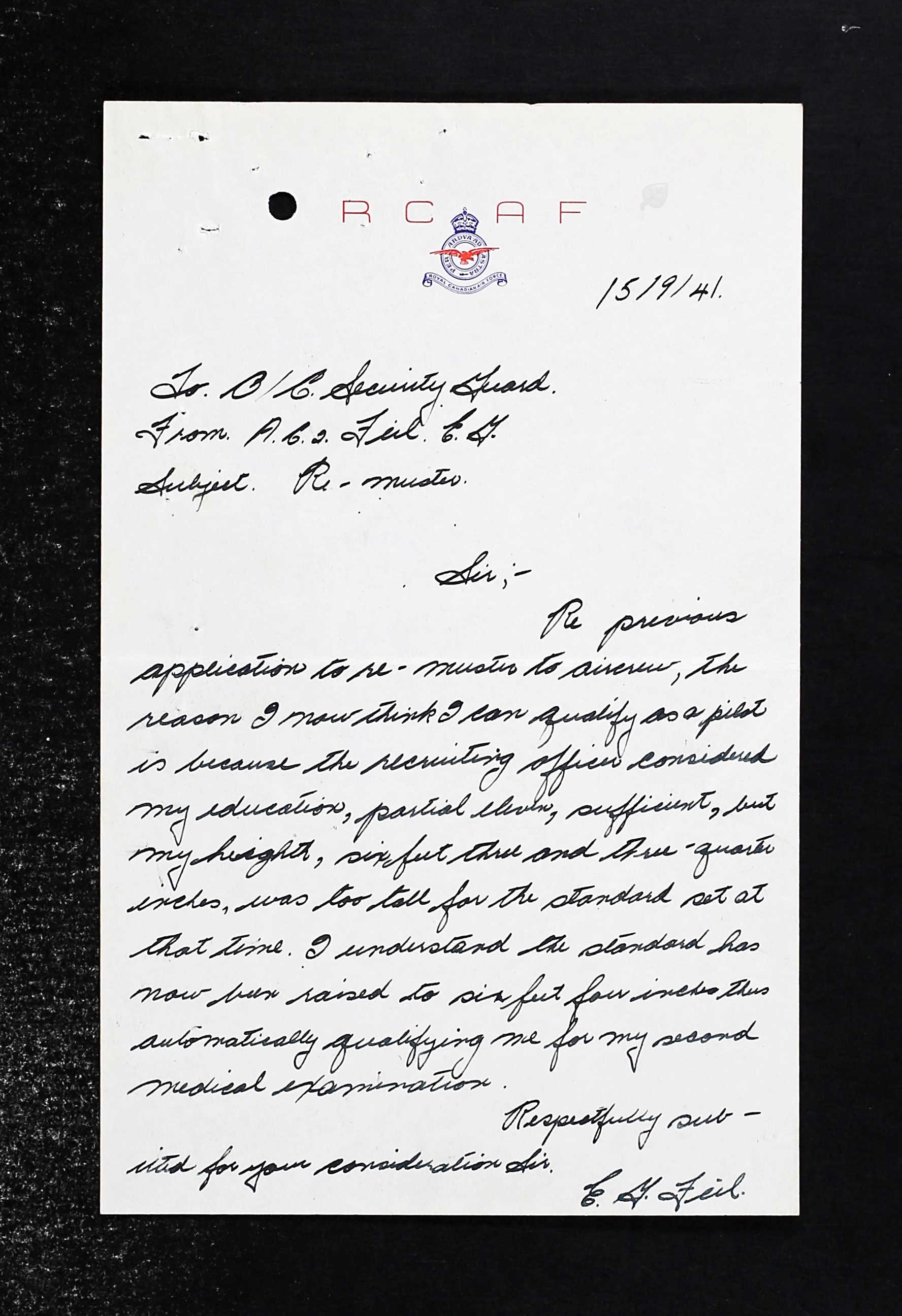
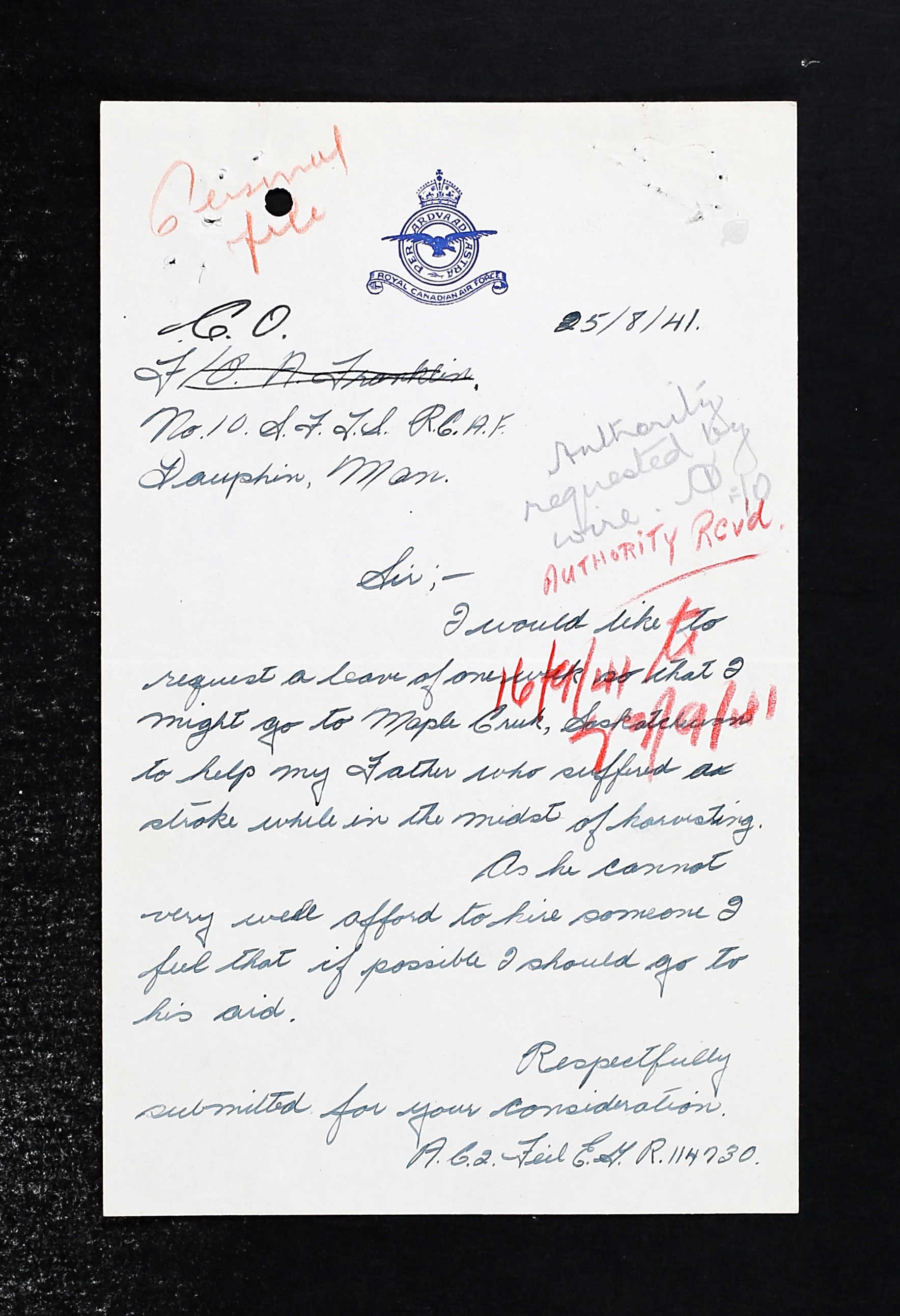
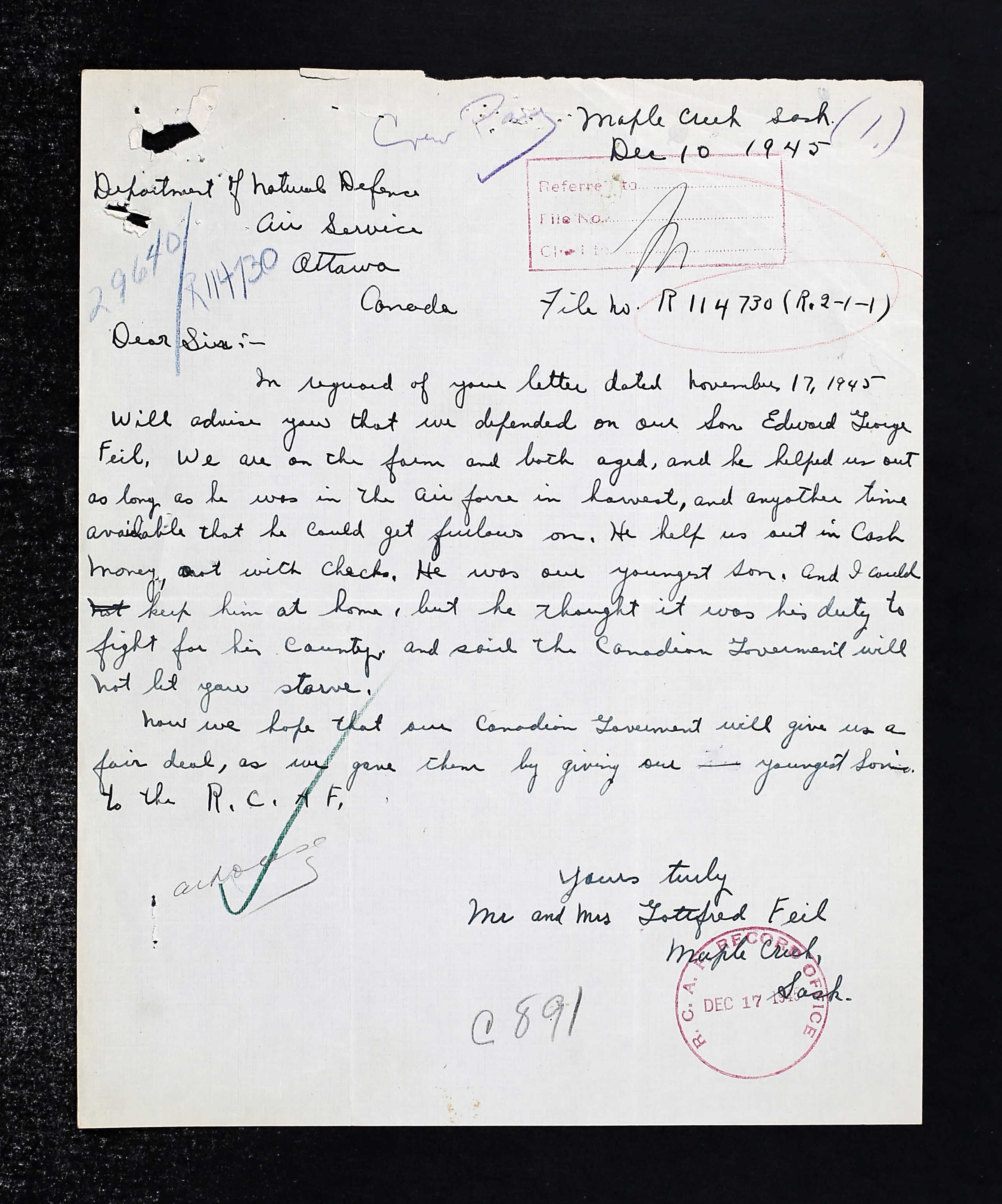
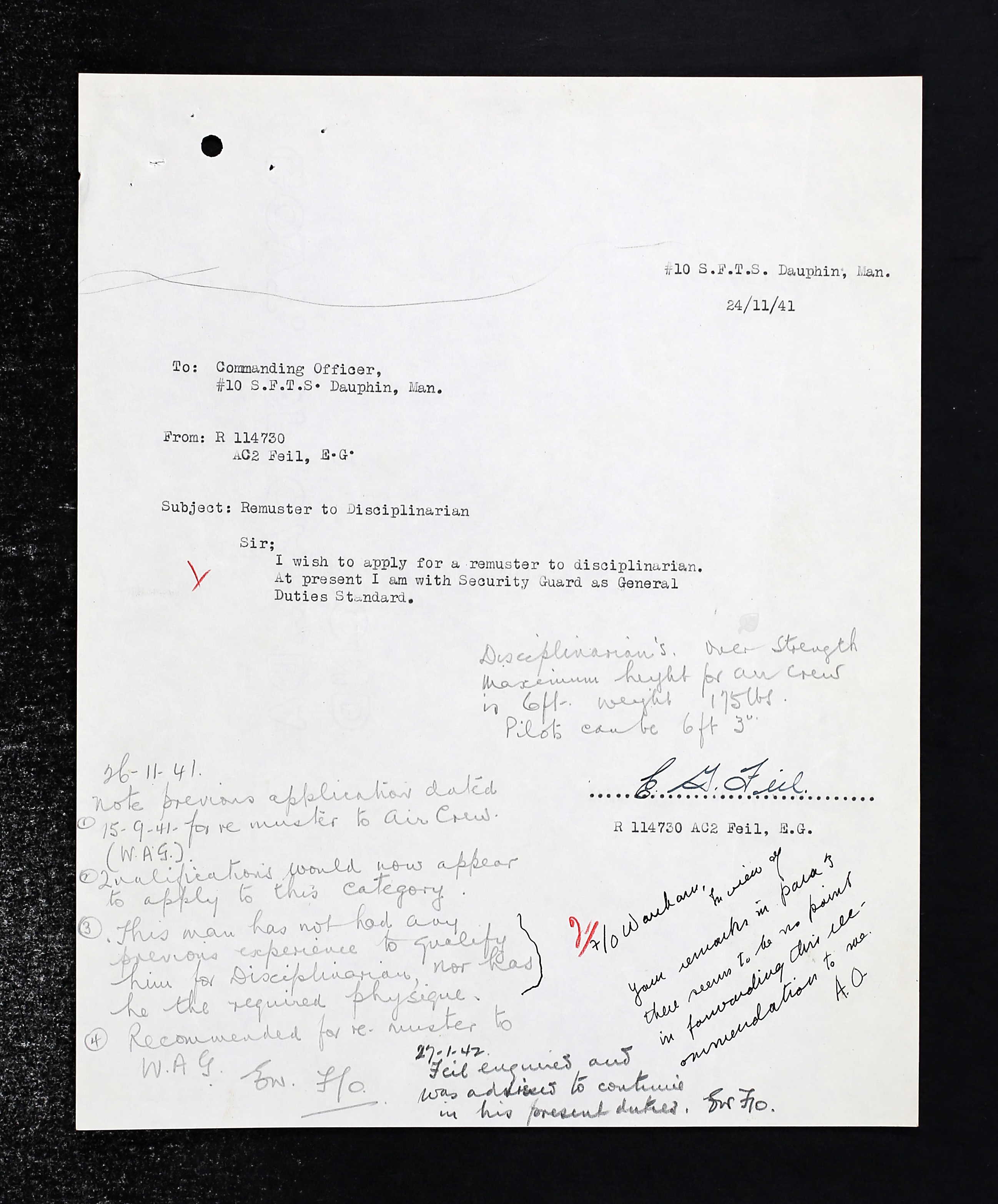
November 30, 1919 - November 14, 1944









Edward George Feil was the son of Gottfried Feil (1883-1952) and Emelia (nee Schmidt) Feil (1889-1985) of Maple Creek, Saskatchewan. His parents were both born in Russia. He had three brothers and one sister: August (1905 - 1994), Lydia Millions (1909-1981), Frederick, and Reinhart (1913-1997). Reinhart was with the Canadian Army overseas. Edward attended the United Church.
He worked as a farm labourer for four years on the family farm. He hoped, after the war, to remain with the RCAF. He indicated he could speak German. He had a partial Grade XI education from Estevan Collegiate.
Edward enjoyed baseball and basketball. He stood 6’ 3 ¾” tall and weighed 149 pounds. He had blue eyes and light brown hair, with a medium complexion.
Edward made The Leader-Post, Regina, Saskatchewan, on July 24, 1941 when his name was listed as one of several air force recruits.
He was in Brandon, Manitoba on July 20, 1941, arriving from Regina. He took the train and was granted one breakfast and one lunch on the CPR.
Edward was in Brandon, Dauphin, Trenton, Botwood, Yarmouth, Gander, then sent west to Vancouver and Ucluclet, British Columbia, posted to No. 4 Squadron in Tofino, BC. His jobs included General Duties, Guard, Second Guard, and then Armourer.
Notes on the back of a letter Edward wrote in August 1941 asking to remuster to aircrew from general duties: “Airman submit another letter fiving us full details of his educational standing. Apparently not qualified for a pilot, but perhaps WAG.” Edward sent a second letter. “The reason I now think I can qualify as a pilot is because the recruiting officer considered my education, partial eleven, sufficient, but my height, six fee three- and three-quarter inches, was too tall for the standard set at that time. I understand the standard has now been raised to six feet four inches, thus automatically qualifying me for my second medical examination.”
Shortly thereafter, Edward requested a leave, as his father suffered a stroke during harvest. “As he cannot very well afford to hire someone, I feel that, if possible, I should go to his aid.” He was granted harvest leave for seven days in September. He was granted additional harvest leaves in September 1943 and September 1944.
In November 1941, Edward applied to remuster to be a disciplinarian. He was a security guard at No. 10 SFTS, Dauphin, Manitoba. Notes on his letter: “Previous application for remuster to aircrew (WAG). This man has not had any previous experience to qualify him for disciplinarian, nor has he the required physique. Recommended for remuster to WAG.” On January 27, 1942, another note stated that he was continuing in his present duties.
June 27, 1942, Edward was “a good worker -- neat appearance,” during his security guard training.
In November 1943, Edward failed to appear at the “place of parade appointed by his Commanding Officer at 0740 hours on November 16, 1943.” He was confined to barracks for three days. Prior, a notation, that might have been struck off indicated Edward had been AWL September 25, 1941 in Dauphin, Manitoba. He forfeited one day’s pay and was confined to barracks three days. He was absent from 0600 hours to 1520 hours.
Between May and October 1944, when he was with No. 4 Squadron, Edward purchased a $100 Sixth Victory Bond. $16.80 was taken off his pay each month.
A letter arrived at the Feil farm in late November 1944. “This station joins me in sending you our sincerest expressions of regret and sympathy, following the untimely news that your son, Leading Aircraftman Edward George Feil, has been reported missing as the result of air operations. This has come to us all as a distinct shock. Your son was a member of a crew whidh left the Station on Tuesday morning, November 14, on a regular patrol. A message received from their aircraft indicated that everything appeared to be proceeding normally. After a period of silence, an intensive and widespread search was instituted the same day. All availale aircraft on this Station, assisted by others from neighbouring Stations, have been continuing the search, both day and night, but so far without success. Please be assured that everything humanly possible is being done to find your son, and that his fellow-airment are working themselves without stint both in tie and energy to that end.” W/C R. R. Dennis, Commanding Officer RCAF Station, Tofino, BC
A letter written on behalf of Mr. Feil to the RCAF, Ottawa, in June 1945: “Your letter received, asking for information concerning our son, LAC Edward George Feil. To the time of writing, there has been no word received of any kind and we do not feel him to have him presumed dead at the present time. As there has been no word of the finding of any one of the men on plane. The ten families of these men are planning on a search party, paying a reward to the finders. Will the Air Force Department be willing to join in on this plan?”
A letter in response was written July 13, 1945: “Receipt is acknowledged of your letter dated June 14th, 1945, in which you advise that plans are being made to organize a search party for the purpose of trying to locate the RCAF aircraft of which your son was a crew member, which was reported missing on November 14th 1944. As you were advised by the commanding officer, RCAF station Tofino BC, in his letter dated November 17th 1944, an intensive and widespread search was carried out both day and night at the time the aircraft was reported missing. In addition, at all times during flying operations, members of the crews of the RCAF aircraft are continually on the lookout for any aircraft which have been reported missing in which have not been located. In view of the fact that an intensive search was carried out at the time the aircraft was reported missing, that a continual lookout is maintained by RCAF aircraft and the length of time which has now elapsed since the unfortunate incident, it is with regret that I must advise you that it is extremely unlikely that a search party such as you suggest would meet with success and under these circumstances, it is felt that you may wish to abandon your plans in this regard.” Group Captain H. de M. Molson.
A letter written on behalf of Mr. and Mrs. Feil to the Department of National Defense, dated December 10, 1945: “In regard to your letter dated November 17, 1945, will advise you that we depended on our son, Edward George Feil. We are on the farm and both aged, and he helped us out as long as he was in the Air Force in harvest and any other time available that he could get furloughs on. He helped us out in cash money, not with cheques. He was our youngest son and I could keep him at home, but he thought it was his duty to fight for his country and said the Canadian Government will not let you starve. Now we hope that our Canadian Government will give us a fair deal, as we have them by giving our youngest son to the RCAF.”
In August 1946, Mr. Feil received a letter from Wing Commander W. R. Gunn. “Some weeks ago, wreckage consisting of a number of small parts which were thought to be from a RCAF aircraft were recovered by the US Coast Guard at Ketchikan, Alaska, and these parts were forwarded to our Headquarters where it was determined that they were from a Canso aircraft, and on contacting the manufacturers of Canso aircraft, they were identified as parts from Canso A 11017 which was the aircraft that your son was on when it went missing from a sea patrol flight from Tofino, British Columbia, November 14, 1944….there is no indication where the crash may have occurred. Such articles as were recovered could travel far driven by wind and tide.”
In late October 1955, Mrs. Feil received a letter telling her that since Edward had no known grave, his name would appear on the Ottawa Memorial. Edward’s name is also etched in his parents’ headstone in Maple Creek, Saskatchewan. “Son & Brother, Edward G. 1919-1944, LAC, RCAF.”
In Edward’s personal belongings, he had a book “Coin Tricks.”